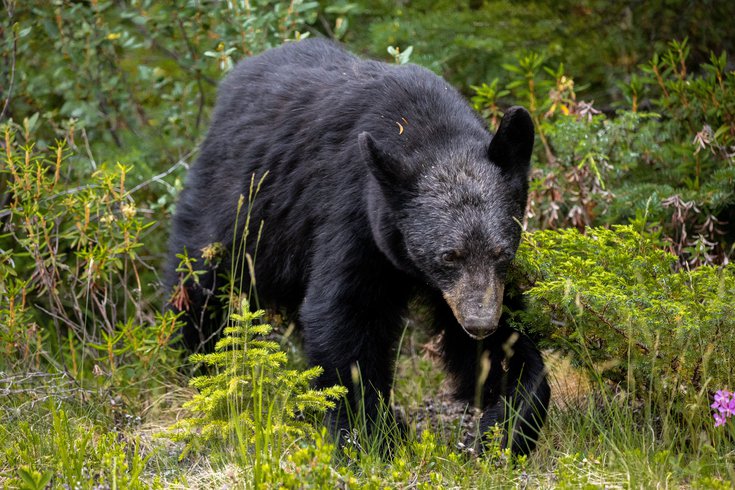
May 24, 2023
 Aaron Brewer/Pexels.com
Aaron Brewer/Pexels.com
Bear attacks are rare, but they tend to happen when the animals sense that they are threatened. Two children in Wright Township, Pennsylvania were injured Monday in a black bear attack. The photo above is a stock image of a black bear.
The Pennsylvania Game Commission is investigating a bear attack that left two children with injuries in Luzerne County on Monday.
The incident happened at a home in Wright Township, about 110 miles north of Philly and 30 miles south of Scranton.
The children, ages 5 and 14 months, were playing in their family's driveway when they encountered the black bear. They were treated for bites and scratches at Wilkes-Barre General Hospital and later released. Their injuries are not life-threatening, officials said.
The game commission said there are few details about what led to the attack. Bear traps have been set in the area. If the animal is caught, officials will try to use DNA testing to identify whether it is the same bear involved in the attack. If it is, the bear will be euthanized as a precaution.
"This is an unfortunate incident and I'm relieved to hear their injuries aren't severe," said Bryan Burhans, executive director of the Pennsylvania Game Commission.
It's unlikely that the bear that attacked the children is prone to aggression toward people, officials said. It was likely triggered by an unknown circumstance.
Usually, black bears are fearful of people and tend to stay away from them. Sometimes, if they live near people and are illegally fed by humans, they become more comfortable. They're drawn to properties where they may have access to food from bird feeders, trash cans, compost bins and charred grills. These items should be removed in areas where bears have become a persistent problem.
When bears attack people, it's often because they are either cornered or are feeling threatened by a dog. This danger increases if the bear is joined by cubs.
In 2020, a Lycoming County family lost its dog — coincidentally named Bear — in a bear attack at their property in Muncy Creek Township. Home owners Sid and Melinda Lebarron witnessed the attack and scrambled inside after attempting to fight the bear off of the dog with a curtain rod. Nearly two years earlier, Melinda had been attacked by a bear while Sid was away and spent two months in a hospital recovering from her injuries. A game commission warden told WNEP that the two attacks were likely from different bears.
A viral video last July showed a Monroe County woman and her granddaughter on their back deck watching a bear and its cubs in their backyard. As the cubs climbed a tree to get to safety, the mother bear made an aggressive bluff toward the two women.
In Sussex County, New Jersey, an 81-year-old Sparta woman was injured last year when she tried to rescue her dogs from a black bear. The woman had let her English springer spaniels outside and found two bears were rummaging through her trash. One of the bears fled into the nearby woods, but the dogs charged at the other bear. The woman suffered head and leg injuries when the bear bit and scratched her. One of her dogs was killed.
Three weeks later, in the same community, a Yorkshire terrier was killed by a black bear after its owner had let it outside. And in Morris County, New Jersey, another dog survived a bear attack at a family's home in Butler last August while its owners were out of town. The family said neighbors usually alert one another when bears are in the area, but they were unable to take precautions during their vacation.
The growing bear population in New Jersey led to the resumption of the state's bear hunt last year, despite longstanding opposition from environmental groups that say other wildlife management strategies would better enable bears and people to coexist. The state's limited bear hunt resulted in 114 bears killed, which was a 7% harvest rate. Its goal was 20%.
Pennsylvania is home to about 15,000 black bears and holds annual bear hunts from early October through early December. Although bears are more common in wooded areas in the northern part of the state, sightings have been on the rise in Southeastern Pennsylvania. They're often seen during the spring and summer months as they forage for food and look to mate in expanding territories.
Bears have been spotted in parts of Philadelphia, Montgomery, Bucks, Delaware and Chester County in recent years. The prevalence of cameras also has contributed to greater awareness of their presence.
People are advised to stay away from bears and follow tips for keeping them away. During encounters, it's best to maintain a distance.
The game commission recommends shouting or waving at a bear in order to get its attention, which is usually enough to scare it away. Even when a bear stands its ground or bluffs a charge at a person, it will generally give an opportunity for a person to back out of an encounter, officials said.